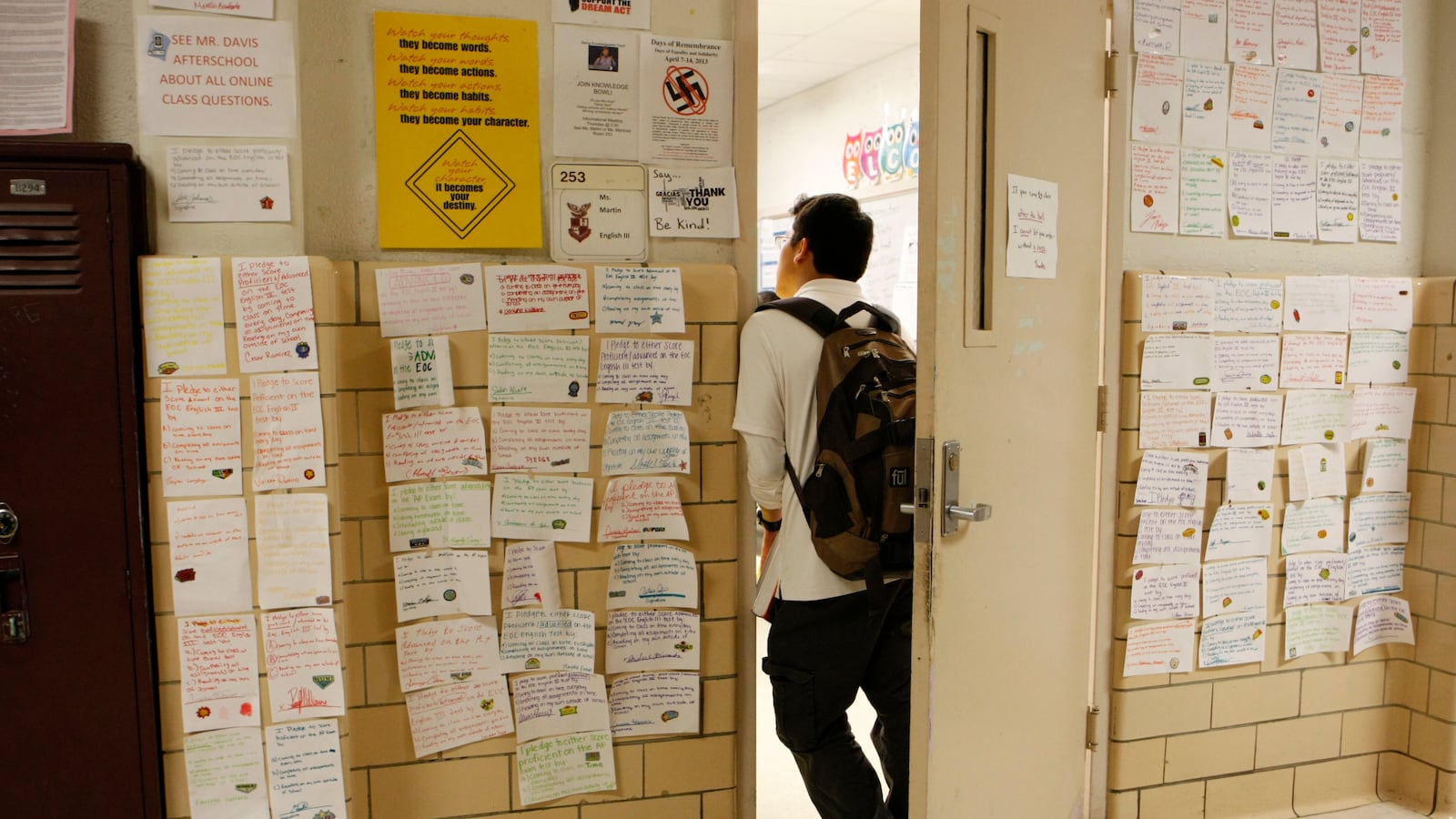As the sun set one dreary Monday in late April, a group of about 15 activists, parents, teachers, and community members gathered in an old church building on N Graham Street, less than a block away from Kingsbury High School.
The agenda: How to save a school and neighborhood they all love.
The concerns they raised about Kingsbury were wide ranging — from a lack of communication with school administrators to escalating violence in the community and fears that the needs of the school’s growing population of Spanish-speaking immigrants aren’t being met.
The catalyst of their meeting, though, was the late March announcement of what Memphis-Shelby County Schools officials call a “fresh start” — requiring teachers to reapply for their jobs in order to return next school year. District officials say the initiative is part of an ongoing process of reevaluating school culture and climate and, in turn, improving academic performance.
Many members of the Kingsbury community have complained that the decision came suddenly and without community input. And at the April gathering, attendees voiced little confidence that a district-led purge of teachers, with the risk of more instability, would help solve Kingsbury’s problems.
Rather, they agreed, real change would have to come from a broad coalition of parents, students, teachers, activists, and community members, all determined to counter decades of disinvestment in the school and their neighborhood.
Zyanya Cruz is working to assemble that coalition. An organizer with the Center for Transforming Communities, Cruz called the meeting in the old church building as part of an effort to form a Kingsbury parent-teacher-student association that would help reconnect the school with its community.
“The school is the heart of the neighborhood, and if you have an unhealthy heart you can’t have a safe and happy community,” Cruz said. “Families are feeling disillusioned and unheard; like they’re not being valued as people. The school is meant to serve them, and it feels as if they’re not being served.”
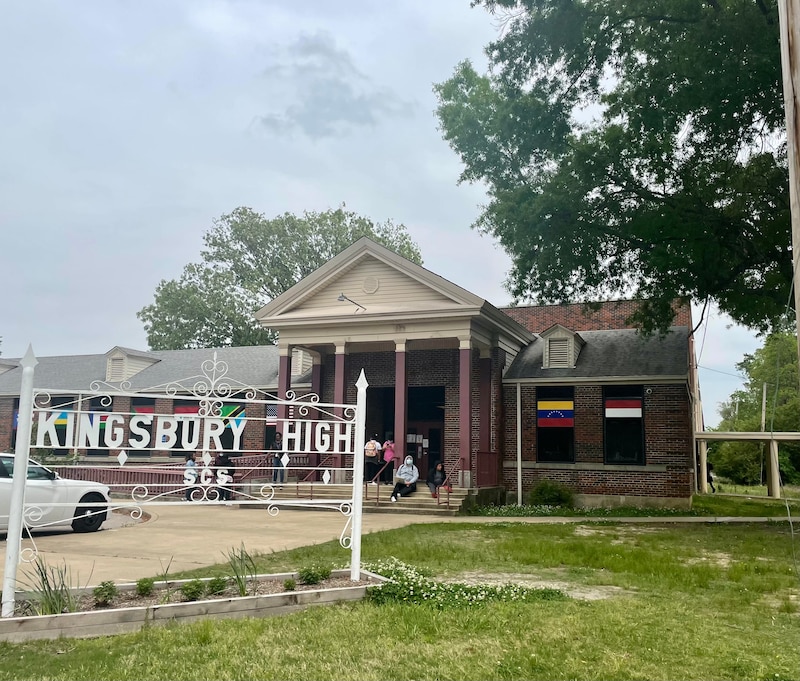
A school’s long transformation
Archived stories from The Commercial Appeal about Kingsbury’s early days in the 1950s and ’60s painted a rosy picture of a beloved school that Memphians were proud to say they attended.
Kingsbury students often made published listings of the honor roll, and stories in the newspaper documented times of athletic prowess for the Kingsbury Falcons. Kingsbury’s alumni included Mike Butler, who went on to become a star basketball player at University of Memphis and play in the pros.
Integration of Memphis City Schools began in the 1960s, and a wave of African-Americans were elected to local government, Daniel Connolly wrote in his 2016 book “The Book of Isaias,” about a Kingsbury graduate who had migrated from Mexico. But the assassination of Martin Luther King Jr. outside Memphis’s Lorraine Motel would “harden racial resentments for decades,” Connolly wrote, leading to white flight and the decline of downtown Memphis.
By the 1990 U.S. Census, Memphis had become a majority-Black city, Connolly wrote. At the same time, “thousands of immigrants began arriving in Memphis, many coming directly from Mexico.”
From 2000 to 2010, Memphis’ Hispanic population soared, primarily in two neighborhoods: Hickory Hill and the area around Kingsbury High. But the community lacked political clout, because many immigrants weren’t eligible to vote. In 2007, Connolly said, the city office dedicated to helping immigrants had just two employees, and neither spoke Spanish.
Today, Hispanics make up just over 55% of the high school’s population, according to the state Department of Education.
Jose Salazar, a local activist, fondly remembers the high school for its diversity and supportive community as he and his family settled into Memphis after emigrating from Mexico.
One memory stands out from his senior year in 2009, when he was part of the Kingsbury soccer team’s historic first run to the state tournament.
Although the season ended with a loss in the state quarterfinals match, a Commercial Appeal article recounted the team’s struggle to fund the trip to the tournament — and the way the community wrapped its arms around the underdog team.
Kingsbury alumni and community members ultimately came up with $15,000 and a coach bus for the trip, ensuring “this team of internationally diverse student-athletes from Liberia, Sudan, Mexico and China would get its chance to compete for a state championship,” the article said.
But Salazar’s experiences at Kingsbury weren’t all positive. Gangs and violence were part of the neighborhood, Salazar said. And those issues have only become worse.
“Kingsbury has always had its problems,” Salazar said. “But I don’t think it’s ever been this bad before.”
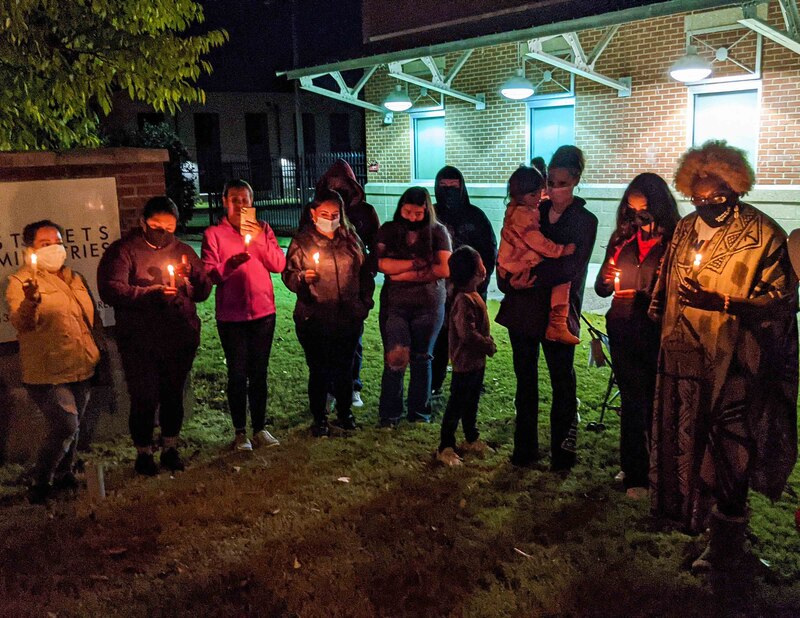
Disagreements about how to deal with rising violence
Salazar has moved out of the Kingsbury neighborhood, but his mother still lives there, and he tries to continue serving the school and community as an activist.
After a late October shooting outside the nearby Streets Ministries left three teens and an adult injured and the community fearful of escalating violence in the neighborhood, Salazar helped organize a candlelight vigil and advocated for more police patrols after school.
Since then, students, teachers and community members have noticed an increased police presence both inside and outside the school, more searches of students, and multiple lockdowns.
The elevated police presence has only made Crystal Oceja, a ninth-grader at Kingsbury, feel less safe and less valued at school.
Earlier in the school year, Oceja said administrators picked two students from each grade and interviewed them about how to make the school safer. Oceja shared concerns about having more police in school with administrators, but said she doesn’t feel that perspective was heard or taken into consideration.
In many ways, school these days is suffocating, like a prison, Oceja said. Uniformed and armed police officers are in Kingsbury’s hallways throughout the day, Oceja said, escorting students to class to ensure they don’t skip. On several occasions, administrators have involved officers in student discipline, Oceja said.
Oceja was also among those who advocated to remove Shelby County sheriff’s deputies from Memphis school buildings in the fall. Despite efforts by “Counselors not Cops” activists, the school board ultimately voted to keep deputies in schools in November.
“A lot of stuff goes down that’s very traumatic in the hood, and if you’re going to a school where you’re not valued, it’s going to affect you even more,” Oceja said. “You feel like no one’s listening to me, my voice doesn’t matter, so why should I speak out? That’s something I’ve noticed in a lot of my peers.”
Another example of how community voices go unheard is the bathrooms, Oceja says. Toilets often get clogged and overflow onto the floors, she says, and the bathrooms are not adequately cleaned afterward.
“A lot of times I purposely hold it until I get home because of how nasty the bathrooms are,” Oceja said. “I can’t ever focus when that happens. That’s all I can think about.”
Oceja aired these concerns to district leaders, including MSCS board Vice Chair Althea Greene, whose district includes Kingsbury, but change has been slow to come.
Greene said she’s heard the community’s complaints about Kingsbury’s bathrooms and the police presence. She’s one of several school board members currently speaking out against unclean school buildings and advocating for changes to the district’s proposed custodial services contract.
And while Greene understands how students feel about police in schools, after the shooting near Kingsbury and “so many incidents with guns” across the district, she said she didn’t see any alternative.
Frustration over ‘fresh start’
Maria Alejandra Oceja, the guardian of her sibling Crystal, said she first learned of Kingsbury being “fresh started” while scrolling through Facebook.
Maria Alejandra Oceja said she doesn’t believe the fresh start is the solution to issues at Kingsbury. She has echoed her sibling’s complaints about the heightened police presence on campus and the poor conditions of bathrooms to school officials and Greene, but has yet to see changes.
“We didn’t ask them to fire the teachers. The teachers are not the problem — they’re the ones who have been holding it down through the pandemic,” Maria Alejandra Oceja said. “To me, it’s the leadership that is the problem, and they’re deflecting responsibility.”
In an interview with Chalkbeat last month, Superintendent Joris Ray said that the “fresh starts” at Kingsbury, as well as Hamilton High School and Airways Achievement Academy, are the continuation of a districtwide restructuring that yielded dozens of new central office leadership positions and school principals — including at Kingsbury and Hamilton.
“I think the fresh start is going to make the schools better and the students are definitely going to benefit,” Ray said. “When you’re a leader, it’s not about making adults comfortable. It’s never about making myself comfortable — each and every day, I’m uncomfortable. The easiest thing to do is what people want you to do, but students will not benefit.”
Greene, the school board member, stands by the decision to ask all Kingsbury teachers to reapply for their jobs, but she also acknowledges that the district “dropped the ball” by not holding a meeting to communicate the decision to parents. After speaking with several concerned students and parents and seeing the chaos and confusion the lack of communication caused, Greene said, the district is now planning that meeting.
“When you ‘fresh start’ a school, I think it’s important that you also ‘fresh start’ the community,” Greene said. “They’ve got to be part of this process in order for it to work.”
Concerns about teacher turnover, support for ELL students
The announcement that they will have to reapply for their jobs has rattled Kingsbury teachers who have already been dealing with the pandemic, violence, lockdowns, and years of administrative turmoil.
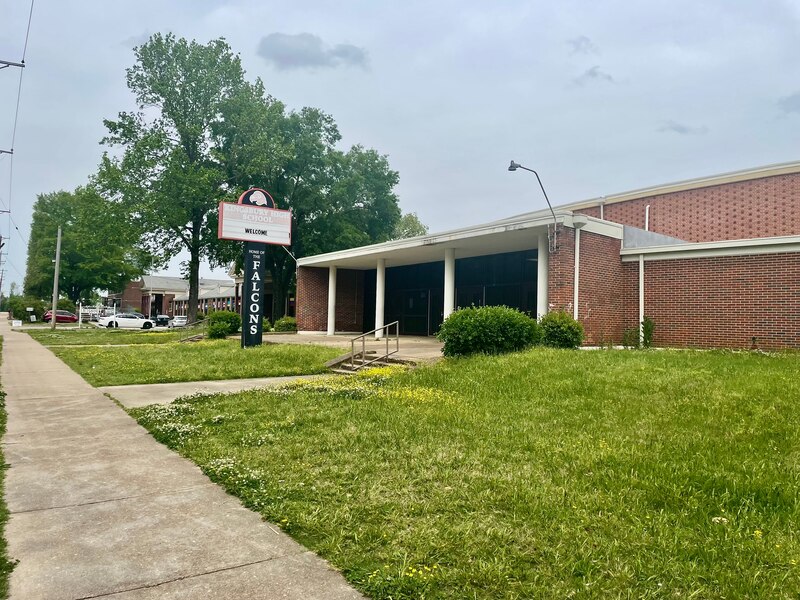
In 2018, a Kingsbury principal, Terry Ross, was suspended due to allegations of harassment of teachers and improperly changed grades. Then, last spring, principal Matt Smith was suspended after being accused of sexual harrassment. A month later, Ray appointed Shenar Miller as Kingsbury’s new principal as part of an academic restructuring, and he remains in the position today.
In the weeks following the “fresh start” announcement, several Kingsbury educators told Chalkbeat they’ve felt increasingly frustrated and underappreciated.
“It was definitely demoralizing to get the fresh start notification,” said one teacher who has decided not to apply for her job and plans to leave MSCS at the end of the school year. She asked not to be named out of fear of retribution during her final weeks.
“I’ve struggled the last few years trying to decide if (teaching at Kingsbury) was the best choice for me — mentally, physically, and for my family — because I’m pouring a lot into my students and it just takes a toll on me,” she said.
The educator, who’s been teaching at Kingsbury for several years, also worries what effect continued turnover will have on Kingsbury. The school seems to be in a “constant state of fresh start,” she said.
Amid a nationwide teacher shortage, the situation only worsened this year, the teacher said, leaving many overwhelmed. Two math teacher positions and an English as a second language teaching position were not filled until January — an especially concerning problem given Kingsbury serves the largest proportion of English language learners among MSCS high schools. Nearly 35% of Kingsbury students receive ESL services, according to state data.
And the population continues growing: In February alone, the teacher said, Kingsbury got at least 12 new students who had just moved to the U.S.
“We’re in a whole different ballpark than what’s happening at other schools,” the teacher said. “We need more resources and support and training to help with that, not a fresh start.”
In a statement, MSCS officials confirmed that the vacant teaching positions were filled Jan. 3, and said they “work to support classrooms with qualified individuals when teacher vacancies arise to ensure there is no disruption to learning.”
Kingsbury’s counseling and ESL departments help ensure students’ needs are met with limited resources, but it’s far from ideal. In addition to lesson planning and grading for all of her students, the teacher also must write individual learning plans for each of her 40 ELL students.
“It’s not that we shouldn’t have to do that. We should; it’s helpful and (the students) should have that type of support,” she said. “But the sheer amount of planning time we have does not allow us to get all that paperwork done.”
Greene said she’s working with district officials and neighborhood organizations like Streets Ministries to ensure ELL students and families at Kingsbury and throughout the neighborhood are able to access the resources they need.
“Schools can only do so much, but because of the language barrier in that neighborhood, I feel like we need to be doing more,” Greene said.
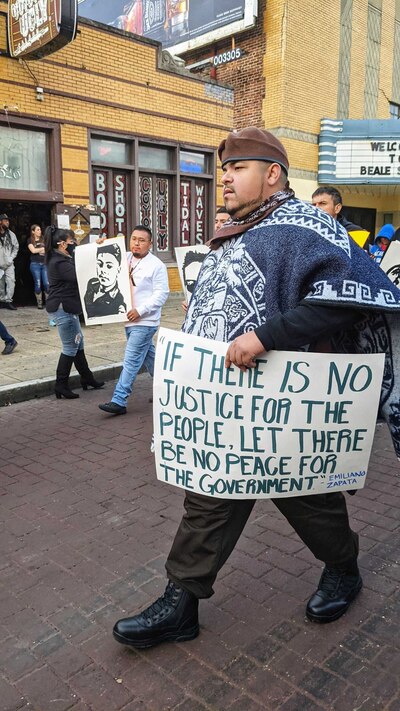
Salazar, the Kingsbury graduate turned activist, said there seems to be a lack of hope and a sense of apathy in the community, perpetuated by poor communication and understanding between the school, students, and parents. For real change to happen, he said, Kingsbury needs more community engagement.
That’s why Cruz, from the Center for Transforming Communities, is striving to launch a Kingsbury PTSA. So far, Cruz has held four meetings to kickstart organizing, and she strives to make them as accessible as possible for families: They’re bilingual, held in the evenings, and include free dinner. The April meeting was at Su Casa, a nonprofit housed in an old church that offers English language lessons and other resources for Memphis’ Latino immigrant community.
After providing English classes to adults for several years, Su Casa expanded its offerings in 2016 to a bilingual preschool program for children in the neighborhood. Executive Director Michael Phillips said he hopes the investment in early childhood education, like the formation of a PTSA, will help build a more engaged community.
“What’s possible,” he asked, “if we really inject some resources into developing leaders today — the young kids, the kids that are in high school right now — knowing that it’s going to take us a generation to really reap the benefits of that?”
For now, Cruz hopes parents and students will feel safe at these meetings voicing their concerns.
And that’s exactly what activists, teachers, and families did at Su Casa in April, as they munched on tacos, talked about Kingsbury’s challenges, and laid out their next steps for forming the PTSA.
In the minutes before they left Su Casa, amid the chatter and goodbyes, the attendees expressed excitement about their momentum — and hope for Kingsbury’s future.
Samantha West is a reporter for Chalkbeat Tennessee, where she covers K-12 education in Memphis. Connect with Samantha at swest@chalkbeat.org.


